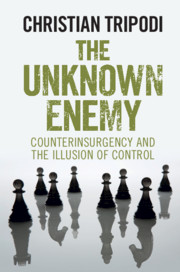Book contents
- The Unknown Enemy
- The Unknown Enemy
- Copyright page
- Dedication
- Contents
- Preface
- Acknowledgements
- 1 Culture Warriors
- 2 Themes and Issues
- 3 Knowledge, Influence and Control
- 4 ‘Peaceful Penetration’ on the North-West Frontier, 1919–39
- 5 ‘Hearts and Minds’ vs French Revolutionary War: Algeria 1954–62
- 6 Pacification in Vietnam 1964–72
- 7 Political Warfare in Iraq: Al Anbar and Basra, 2006–9
- 8 Political Warfare in Afghanistan: Helmand Province, 2006–12
- 9 Conclusion
- Bibliography
- Notes
- Index
7 - Political Warfare in Iraq: Al Anbar and Basra, 2006–9
Published online by Cambridge University Press: 06 November 2020
- The Unknown Enemy
- The Unknown Enemy
- Copyright page
- Dedication
- Contents
- Preface
- Acknowledgements
- 1 Culture Warriors
- 2 Themes and Issues
- 3 Knowledge, Influence and Control
- 4 ‘Peaceful Penetration’ on the North-West Frontier, 1919–39
- 5 ‘Hearts and Minds’ vs French Revolutionary War: Algeria 1954–62
- 6 Pacification in Vietnam 1964–72
- 7 Political Warfare in Iraq: Al Anbar and Basra, 2006–9
- 8 Political Warfare in Afghanistan: Helmand Province, 2006–12
- 9 Conclusion
- Bibliography
- Notes
- Index
Summary
In 2007 General David Petraeus, commander of coalition forces in Iraq, addressed the US Congress on the matter of the highly successful battle then being waged against Al Qaeda in Iraq (AQI). Pointing to events the previous year in Anbar Province and the so-called Awakening there which had signalled the beginning of AQI’s demise, he noted the transformative effects achieved when US forces and local tribes had united in order to destroy their common enemy. While Anbar was unique, he stated, ‘it nevertheless demonstrated the dramatic change in security possible with the support and participation of local citizens’.2 Indeed such was the drastic change in American fortunes over a short period of time that the Anbar Awakening drew huge attention from policymakers and academic and military commentators keen to understand how the methods used might aid a revolution in COIN. The example of Anbar and the subsequent spread of the Awakening movement elsewhere in Iraq appeared to all and sundry to be a twenty-first-century counterinsurgency paradigm. It featured a new and sophisticated doctrine (FM 3-24), a renewed emphasis upon the importance of cultural intelligence, and a highly adaptive response by commanders to local political conditions that had allowed the transformation of a previously moribund politico-military effort into a war-winning design. Such was the apparent success of the model that the campaign in Anbar 2006–8 was hailed by many as the pre-eminent example of US counterinsurgency success in the post-war era.
- Type
- Chapter
- Information
- The Unknown EnemyCounterinsurgency and the Illusion of Control, pp. 138 - 164Publisher: Cambridge University PressPrint publication year: 2020



